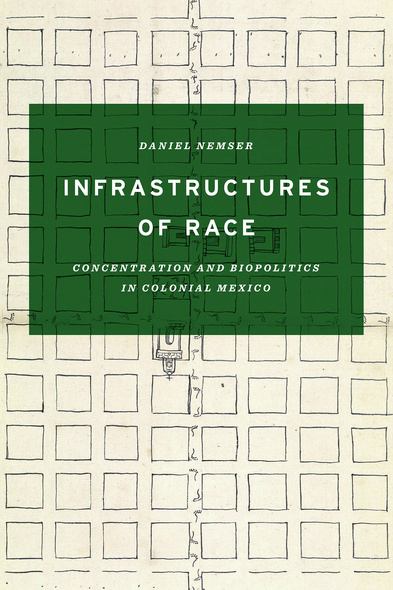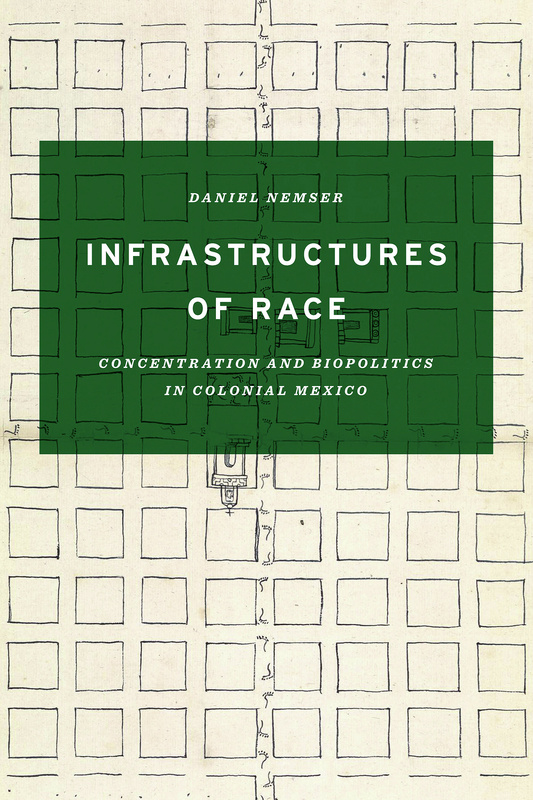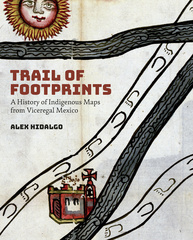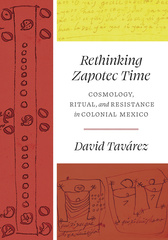
Infrastructures of Race
Concentration and Biopolitics in Colonial Mexico
Winner, Humanities Book Prize, Mexico Section of the Latin American Studies Association, 2018
Many scholars believe that the modern concentration camp was born during the Cuban war for independence when Spanish authorities ordered civilians living in rural areas to report to the nearest city with a garrison of Spanish troops. But the practice of spatial concentration—gathering people and things in specific ways, at specific places, and for specific purposes—has a history in Latin America that reaches back to the conquest. In this paradigm-setting book, Daniel Nemser argues that concentration projects, often tied to urbanization, laid an enduring, material groundwork, or infrastructure, for the emergence and consolidation of new forms of racial identity and theories of race.
Infrastructures of Race traces the use of concentration as a technique for colonial governance by examining four case studies from Mexico under Spanish rule: centralized towns, disciplinary institutions, segregated neighborhoods, and general collections. Nemser shows how the colonial state used concentration in its attempts to build a new spatial and social order, and he explains why the technique flourished in the colonies. Although the designs for concentration were sometimes contested and short-lived, Nemser demonstrates that they provided a material foundation for ongoing processes of racialization. This finding, which challenges conventional histories of race and mestizaje (racial mixing), promises to deepen our understanding of the way race emerges from spatial politics and techniques of population management.
Nemser's work offers a theoretically complex and multifaceted argument that shows how the material and the ideological worked in conjunction to form colonial notions of race, especially those defining indigenous subjects.
Nemser's writing is strong and often inspired throughout . . . Overall, this book will provide deeply thought-provoking for scholars versed in the aforementioned fields, particularly those interested in Mexican history, the questions of Marx and Foucault's utility to postcolonial studies, the process of racialization, the relationships of ideas to the material world, and legacies of human concentration. Its arguments are sure to fuel discussion, especially about the nature of Mexican history and race, for years to come.
Infrastructures of Race provides essential historical background for present-day interrogations of how infrastructures – from aged water pipes to search engine algorithms – reinforce persistent racial inequalities...Through Nemser’s case studies, we can better apprehend the hundreds of years of oppression that have been built into our material lives.
[Nemser makes] a valuable contribution to the field: to wit, race is not an idea, but a structure.
Nemser contributes a thoughtful exploration of colonialism’s legacies...this is an impressive work, one that would be especially fruitful for scholars situated at the intersections of biopolitics, race, and decolonial studies. [Nemser] leverages themes of space and structure to bring light to a unique understanding of racial subjectivities during the colonial encounter and into the present.
[A] groundbreaking and beautifully written monograph...historians, anthropologists, and cultural studies scholars will find in this book a welcome and provocative approach to studies of race in colonial Latin America in particular, but one that can and should be considered in other colonial contexts as well.
A rich history of how race was conceptualized and materially inscribed in colonial Mexico—and a pleasure to read. The book’s contributions are manifold, and it will be in conversation with other books in the field, while expanding the discussions with which the colonial period can engage.
Nemser’s work will be widely read and discussed both within and outside Latin American history and cultural studies. It combines meticulous research, erudition, theoretical dexterity, and a formal elegance that allows readers to enter and engage directly with the colonial genealogy of modern biopolitics.
- Acknowledgments
- Introduction. Before the Camp
- Chapter 1. Congregation: Urbanization and the Construction of the Indian
- Chapter 2. Enclosure: The Architecture of Mestizo Conversion
- Chapter 3. Segregation: Sovereignty, Economy, and the Problem with Mixture
- Chapter 4. Collection: Imperial Botany and Racialized Life
- Epilogue. Primitive Racialization
- Notes
- Bibliography
- Index










